- Home
- Barry Eisler
Requiem for an Assassin Page 10
Requiem for an Assassin Read online
Page 10
Maybe I could use family as a threat: Kill Dox, and I’ll slaughter your aging parents, or your adorable nieces, or whatever. Hilger might know about my rules regarding women and children, but what he saw in my eyes in the Góc Saigon would have shaken his confidence.
But no, that kind of threat could take things in unpredictable directions. I’d given Hilger a slim reed of hope with my talk about getting out of the life. Better to leave it at that, play along for time, and work my way back to him, and wherever he was holding Dox.
After five minutes, I checked the e-mail account again. Kanezaki’s reply was already waiting, a simple, I’m here.
I purged the e-mail account and purged and shut down the browser, then left for another Internet café. My paranoia was running hot, and I didn’t want to do anything else on the same computer, with the same identifiable IP address, I had just used to contact Kanezaki. I doubted Hilger would be able to trace me through a Saigon Internet café IP address, and even if he could, at most he’d only be able to tell where I’d gone on the Net, not what I’d done or said there. But I’ve lived as long as I have by not taking risks without good reasons.
From the second café, I checked on flights out of Saigon. There was a 9:10 P.M. ANA flight to Bangkok that night. Perfect. From Bangkok I would have my pick of flights to Tokyo. I booked the flight, purged again, and went to a third café.
This time, I Googled Jannick. The first hit identified him as the founder and CEO of a Silicon Valley startup called Deus Ex Technologies. “From God” Technologies…whatever they were selling, they weren’t modest about it.
I followed the link and perused the site. Once I finished sorting through the jargon about migration automation and cross-platform schema and backpropagation and Bayesian theory, I understood that DET’s focus was databases, specifically database search. They were trying to use neural networks—computers modeled on the cortex of the human brain—to spot previously hidden patterns in massive databases.
Jannick had earned a Ph.D. in computer science at Stanford University in 1982. Since then he’d worked for Microsoft, Oracle, and several small companies I hadn’t heard of. DET was his first startup. I checked the funding page, and was surprised to see that Jannick was funded by In-Q-Tel—the CIA’s venture capital fund. I didn’t know what it meant, but it had to mean something.
I thought about what Kanezaki had once told me about Hilger’s privatized intelligence outfit. Unencumbered by congressional oversight, he could go places and do things the CIA couldn’t. It wasn’t clear how he had gotten started—on his own, or with his own version of governmental venture capital backing. Whatever the answer, the funds would be untraceable now, deniable. If Hilger’s activities got out, his customers, or his paymasters, would simply express shock and dismay at the uncovering of this “rogue” operation; reaffirm the importance of proper oversight; and, if necessary, convene a blue ribbon commission to whitewash the government’s complicity and decide on an appropriate fall guy. Thank you for playing, Mr. Hilger. Next contestant.
It was natural enough, I supposed. Democracy is about checks and balances. But if the policymakers find they’re being checked and balanced a little too much, they look for what the software types call work-arounds. Can you blame them? You might as well blame water for trying to go around a rock. It’s not a question of blame and fault; it’s a question of nature and proclivities. If there were no demand for Hilger’s services, or for mine, for that matter, there wouldn’t be a supply.
I wondered why Hilger would want to eliminate the CEO of a CIA-funded outfit offering neural net database technology. Was Jannick competition of some sort? Did his work interfere with something Hilger was trying to do, or threaten a market Hilger wanted to get into? No way to know, not yet.
I considered how Hilger might try to trace me, making sure I hadn’t missed anything. He would expect me to Google Jannick right away. If he had access to the data, he could start with searches for Jan Jannick that occurred, say, one hour after our meeting at the Park Hyatt. Cross-reference the hits with servers in Vietnam, and you’d have the IP address of the computer I used. A long shot, maybe, but not impossible. But now, even if he had the access, he could confirm no more than that I’d checked out Jannick, as he would have suspected. My other Internet activity would remain sterile.
I caught a cab back to my hotel, collected my gear, and headed directly to the airport. Hilger might have anticipated the move and put people at one of the choke points inside—check-in, maybe, or outside customs—but I doubted it. Too many cameras, too much security. Also, my gut told me he really wanted Jannick dead. If so, I’d be safe until it happened.
Afterward was a different story.
12
HILGER DID a surveillance detection route, and, when he was satisfied neither Rain nor anyone else was following him, headed to the Sheraton, his rendezvous point with Demeere. He walked slowly, sweating in the tropical evening heat, only dimly aware of the humidity and the smell of diesel and spices he couldn’t name, ignoring the incessant horns, the shouted invitations from motorcycle cabs, the dizzying whine of two-stroke engines.
That had been a close thing with Rain, a hell of a close thing. If the man had been bluffing at the Góc Saigon, it was the best bluff Hilger had ever seen. When Rain held that knife to his neck, and he saw what was in Rain’s eyes, he really thought he was done. He had thought, I miscalculated, he doesn’t care about Dox, the crazy bastard’s going to kill me right here.
Hilger had been an inch from death twice before. The first time was in Baghdad, when a sudden sneeze from the omnipresent sand and dust had jerked his head a fraction, just far enough for a sniper round to crease his scalp instead of his skull. He’d called in artillery, and a minute later the sniper was vaporized. The second time, his rifle had jammed and he had to engage one of Saddam’s Fedayeen hand-to-hand. The man had tried to gut Hilger with a Bedouin knife that broke off on Hilger’s flak jacket, and Hilger knocked the man down with his rifle stock, then beat him to death with the butt, pulverizing his skull. Both times, the initial elation had given way to a feeling of wonderment at the miracle of still being alive, and then to a long period of reflection on the fragility of everything. He’d dodged two bullets, one of them literally, but those were only the two he knew about. How many went right by us, every day, without our even knowing?
Well, he’d just survived his third, and now that he was out of Rain’s presence, now that the operational exigencies were behind him and he could acknowledge what had happened, that post-combat giddiness was kicking in. His legs felt rubbery and his hands were trembling. He’d known Rain by reputation, and by their one brief encounter in Hong Kong, but this was the first time he’d really seen him up close and personal. He recognized the type, although he’d known only a very few: Rain was a killer, a natural predator. The hesitation, the hand-wringing, even the paralysis that afflicts ordinary men, it was all absent from what he’d seen in Rain’s eyes.
Hilger had done his share of killing, most recently that idiot Drano in Bali, but he didn’t consider himself to be in Rain’s class. He knew his own ability to kill, while formidable, was also something cerebral, something he had learned. Rain was a different breed. Killing was in him, down deep, and whatever that quality was, whatever name could be ascribed to it, Hilger suspected Rain had been born with it. He wasn’t sure if that would be a blessing or a curse. What he did know was that he wouldn’t want it for himself. He valued control too highly, and Rain’s control of that killing part of himself was clearly questionable. He’d been struggling with it in the restaurant, and it could easily have gone the wrong way.
He crossed the street and saw Demeere, waiting in front of the hotel as though for an acquaintance or a cab. Vigilant as always. Hilger gave him the slightest nod as he passed to let him know everything was fine, then took the elevator to the bar on the twenty-third floor. Demeere arrived a few minutes later. They sat on the terrace, a sticky breeze rustling the tableclot
hs, the sounds of traffic diminished now, pleasant, the lights of the city twinkling all around them.
“You want something to drink?” Hilger asked. “I could use something.”
“Sure,” Demeere said. They ordered a pair of Bombay Sapphires, doubles, and when the waiter had departed, Demeere said, “I couldn’t stay with you. He would have made me, I could feel it.”
Hilger nodded. “You played it right and we knew you’d probably have to let me go. It worked out.”
“He’s going to do it, then?”
“It looks like it.”
“Can he really manage it in five days?”
Hilger thought again of what he’d seen in Rain’s eyes. “Yeah. I think he can.”
“And then?”
“Then things start to open up for us. And we give him the second target.”
“And then the third?”
Hilger looked at him, and understood that, as usual, Demeere’s intuition was sound.
“The third target is Rain,” Demeere said.
Hilger nodded. “He’s too dangerous to leave alone. Especially after what he’s doing for us now.”
The drinks came and they sipped them in silence. The gin was just what Hilger needed. He could feel it relaxing him, anesthetizing his still slightly jangled nerves. He’d been planning this for a long time and a lot of things still had to play out just right before it was over. But they were off to a good start. It was strange to think how much good it was going to do the country, and yet everyone would believe it was the work of the country’s enemies. Well, strong medicine could be like that. It wasn’t the bitter taste that mattered. It was the beneficial effect.
13
I CHANGED PLANES in Bangkok and slept most of the six hours to Tokyo. I arrived at Narita at seven-thirty the next morning. An hour and a half later, I was at Tokyo Station. I emerged from four stories underground into a cold, sunlit morning. I stood for a few minutes outside the massive red brick façade of the building, my carry-on bag slung over my shoulder, watching and listening. Truck engines and car horns. Construction equipment, jackhammers. Commuters flowing by me in their nameless thousands, squinting against the harsh morning light, hunched into the wind, briefcases gripped like life preservers. The moment I felt it, I realized how I missed the overwhelming energy of the place, missed it like the perfume of a woman I secretly loved, who slowly crushed me with her indifference.
I sighed. Tokyo was a sad place for me now, the people connecting me to it disappearing one by one, like lights going out at night in the windows of an almost empty building. First, Midori. Then Harry, set up and thrown off the roof of a building. Then Naomi, the sweet Brazilian Japanese dancer I’d gotten involved with while hunting a yakuza assassin named Murakami, and who I’d left in Rio after discovering she’d told the CIA where to find me. And then, only a year ago, Tatsu, my onetime nemesis and then loyal friend with the Keisatsuche, the Japanese FBI, to cancer. After that, Tokyo had become for me just another way station, a meeting venue. And soon, even that would be gone, when Kanezaki was recalled to headquarters or transferred to some other post or left for a career in industry. If I came back then, all I would find would be a graveyard of memories.
I called Kanezaki from a pay phone. “It’s me,” I told him.
“Didn’t take you long.”
“Can you meet?”
“Of course.”
The “of course” was a perfect imitation of Tatsu, right down to the mildly exasperated tone, which was intended to only ill-conceal the vast reservoirs of patience needed in the face of so many stupid questions. Hearing Tatsu’s quirks live on in Kanezaki, whom I knew Tatsu had mentored, and whom he had perhaps in his mind even adopted as a surrogate after losing his own son, caused me a pang of sadness, and a small smile.
“How about breakfast?” I asked.
“An early lunch would be better. I’ve got a few things to do.”
I instantly disliked the counteroffer. It would give him time to arrange things, if…
If what? In the last few years, Kanezaki had a half-dozen opportunities to try to set me up. He never did, nor, as far as I could tell, did he have any reason to. I’d dropped in suddenly. He had things to do, like he said.
Still, I didn’t like it. If I hadn’t needed him so much right then, I might have bailed. Instead, I said, “All right. How about the place we met last time. When it opens.”
That would be Ben’s café in Takadanobaba, at eleven-thirty. A nice, out-of-the-way, neighborhood kind of place that served fresh bagels, quiche, and excellent coffee. I knew the area well. I’d get there early for countersurveillance. Just in case.
“I’ll see you there,” he said, and clicked off.
I took the Yamanote line to Takadanobaba and got to Ben’s a little less than two hours early. I set up just past the edge of the window in a convenience store across and slightly down from the café, my eyes on the street. Japanese convenience stores don’t mind their magazines being used as a lending library, and I took full advantage.
Nothing set off my radar, and Kanezaki showed right on time. He glanced back through the store window as he went by, doubtless seeing me in the corner but giving no sign of it.
Shit, I thought. I don’t like getting nailed, even by a probable friendly. I watched to make sure he was alone, then drifted out of the store and caught him as he went into Ben’s.
“Hey,” I said, coming up behind him.
He turned without any sign of surprise. “Hey.”
“You saw me in the convenience store.”
He shrugged. “Yeah, it was where I would have set up, too. But I didn’t figure you were one for the girlie magazines.”
“What else do people read when they’re loitering like that?” I said, still feeling a little defensive. “I was just being another middle-aged pervert. Blending.”
“I think you were enjoying your work.”
I realized that, not for the first time, I was underestimating this kid, this young man, rather, who was more seasoned every time I saw him. He was getting smarter, and I needed to get smarter about it. He knew my tactics now, knew that I wouldn’t be waiting where I said I’d be. And he was becoming sufficiently tactical himself to know where I’d probably be, instead. I had to stop playing him as though he was still a beginner. He wasn’t, and hadn’t been for a long time.
I smiled. “Maybe a little. I was there for two hours. It wouldn’t have gone by as fast with Car and Driver.”
We shook hands, and I looked him over. I nodded in approval of what I saw: a slim, thirtysomething Japanese American with the kind of serious eyes you get from realizing the world isn’t the innocent place you once imagined it to be, and from suspecting that what you do makes you complicit.
Over sandwiches and coffee, using English and keeping my voice low so as not to be overheard by the other patrons, I briefed him on everything that had happened with Hilger and Dox. I explained that there were three hits, but told him I didn’t yet have any specifics. Given Jannick’s CIA backing, I judged any mention of him too risky. The CIA connection might have been relevant to Kanezaki, for reasons I couldn’t yet understand. He might have felt obligated to warn Jannick, or to otherwise prevent me from carrying out the hit. If protecting Jannick was important enough to Kanezaki, telling him might even have been dangerous. If someone wants to get to you, and he knows who your target is, he doesn’t have to find you. He just has to find your target, and wait for you to show up.
When I was done, he said, “I’m sorry to hear about all this.”
I looked at him. “Sorry isn’t really what matters here. What matters is what you’re going to do about it.”
“What do you expect me to do?”
I felt a flush of irritation. “I expect you to help Dox.”
“I don’t really know how much I can.”
“How many jobs has he done for you? Three? Four?”
“We’ve worked together. But that doesn’t mean…”
&n
bsp; “Cut the bullshit,” I said, gripping the sides of the table and leaning forward. “He’s in trouble now, bad trouble, what are you going to do, abandon him?”
I realized I was half out of my seat. The words themselves were fueling my rage. It was the iceman, wanting a reason to hurt someone, anyone, for Dox.
Easy, I thought. Easy. I exhaled sharply and slowly sat back down. I let go of the table and flexed my hands.
Kanezaki was as quiet as a man who turns a corner to find himself face-to-face with a growling attack dog. If he hadn’t been sitting, he would have been backing up.
After a moment, he said, “Dox is a good man. I’m grateful to him professionally and I like him personally. But he’s a contractor. That’s his choice.”
I looked at him, still trying to get a grip on myself. I thought about telling him it was fine, he could do anything he wanted. As long as he understood that if Dox died, so would he.
I shook my head. What was I thinking? Threats were the way I had played things when I was young and stupid. I was lucky to have lived long enough to find more effective means of persuasion. And the kind of help I needed here wasn’t something I could extort.
Back off, I thought, as though actually talking to someone inside me. Back off.
“Look,” he said, his hands up, palms forward, “I’m not saying I won’t help. Just that you’re still on the hook for the toys I got you guys last year.”
He was referring to a tranquilizer gun and some considerably more lethal hardware he had procured for Dox and me in Tokyo. We had used it all to interrupt a drug deal in Wajima and touch off a small war between the Japanese yakuza and the Chinese triads. The war had forced a yakuza enemy of mine, Yamaoto, into the open, finally giving me the opportunity to kill him.

 All the Devils
All the Devils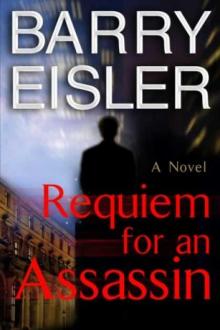 Requiem for an Assassin
Requiem for an Assassin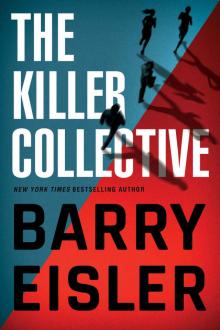 The Killer Collective
The Killer Collective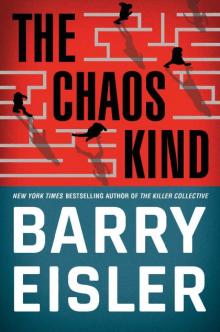 The Chaos Kind
The Chaos Kind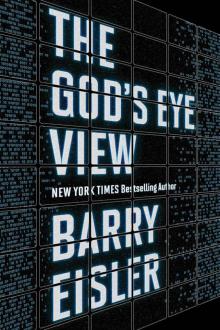 The God's Eye View
The God's Eye View Paris is a Bitch
Paris is a Bitch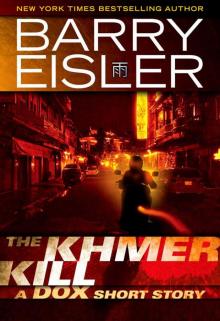 The Khmer Kill: A Dox Short Story (Kindle Single)
The Khmer Kill: A Dox Short Story (Kindle Single)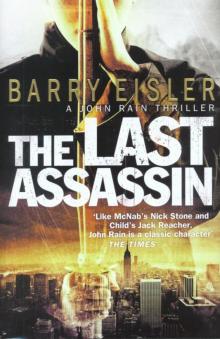 The Last Assassin
The Last Assassin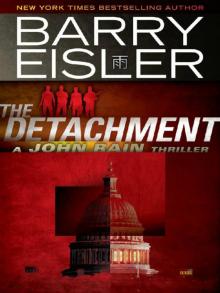 The Detachment
The Detachment The Night Trade (A Livia Lone Novel Book 2)
The Night Trade (A Livia Lone Novel Book 2)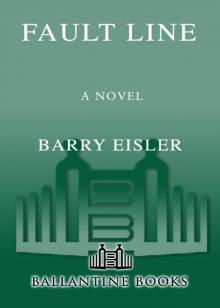 Fault Line
Fault Line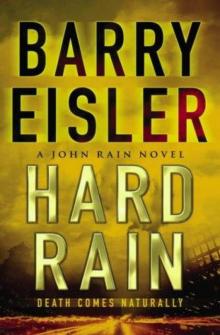 Hard Rain
Hard Rain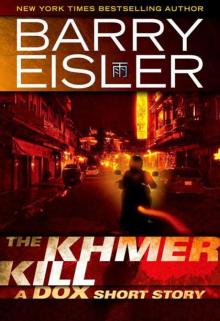 The Khmer Kill_A Dox Short Story
The Khmer Kill_A Dox Short Story London Twist: A Delilah Novella
London Twist: A Delilah Novella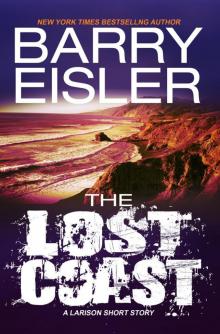 The Lost Coast
The Lost Coast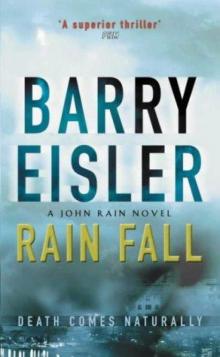 Rain Fall
Rain Fall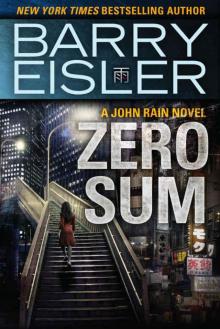 Zero Sum
Zero Sum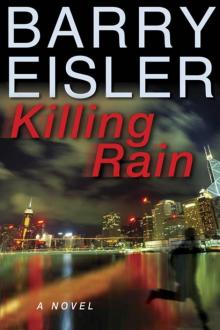 Killing Rain
Killing Rain John Rain 08: Graveyard of Memories
John Rain 08: Graveyard of Memories A Clean Kill in Tokyo (previously published as Rain Fall)
A Clean Kill in Tokyo (previously published as Rain Fall) Inside Out: A novel
Inside Out: A novel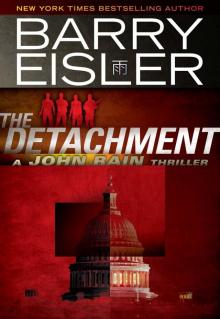 John Rain 07 - The Detachment
John Rain 07 - The Detachment Graveyard of Memories
Graveyard of Memories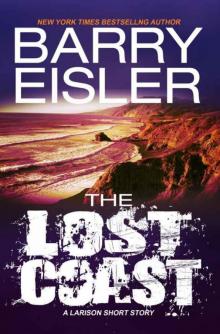 The Lost Coast -- A Larison Short Story
The Lost Coast -- A Larison Short Story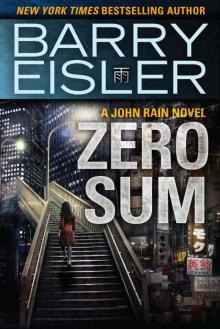 Zero Sum (A John Rain Novel)
Zero Sum (A John Rain Novel)